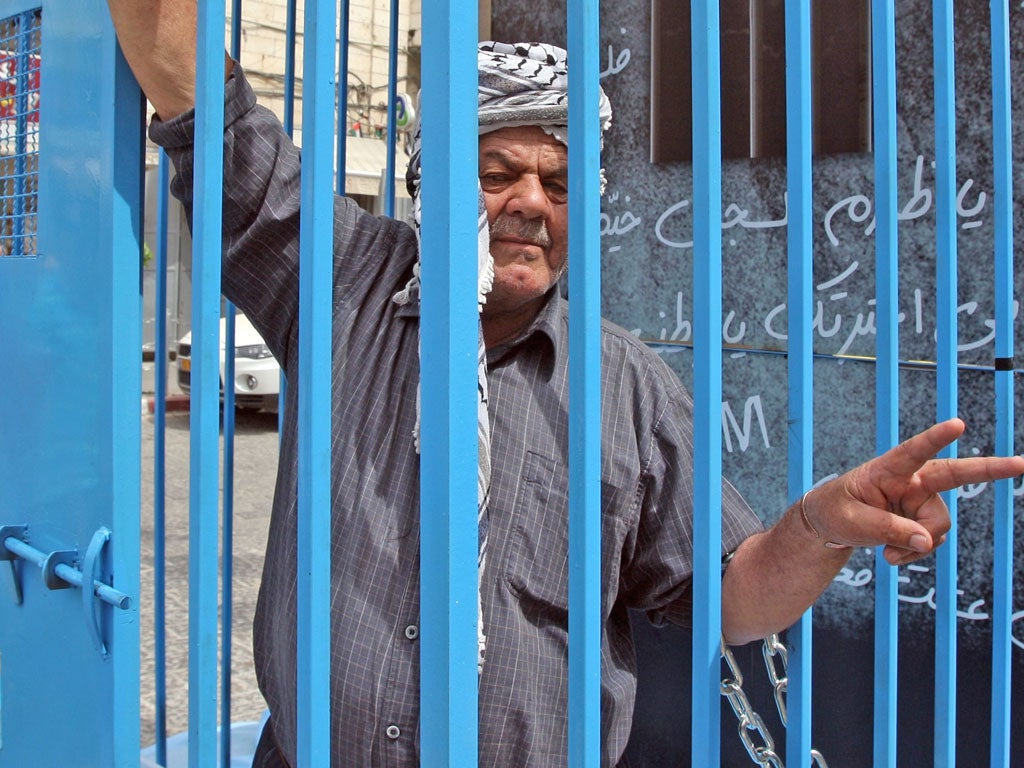Israel bows to pressure to end mass hunger strikes by Palestinians
Deal struck to relax strict rules and stave off unrest in the region

Your support helps us to tell the story
From reproductive rights to climate change to Big Tech, The Independent is on the ground when the story is developing. Whether it's investigating the financials of Elon Musk's pro-Trump PAC or producing our latest documentary, 'The A Word', which shines a light on the American women fighting for reproductive rights, we know how important it is to parse out the facts from the messaging.
At such a critical moment in US history, we need reporters on the ground. Your donation allows us to keep sending journalists to speak to both sides of the story.
The Independent is trusted by Americans across the entire political spectrum. And unlike many other quality news outlets, we choose not to lock Americans out of our reporting and analysis with paywalls. We believe quality journalism should be available to everyone, paid for by those who can afford it.
Your support makes all the difference.Israel yesterday agreed to relax significant elements of the regime for Palestinian prisoners in an eleventh hour deal which ended a mass hunger strike that had threatened to unleash widespread unrest across the West Bank.
The Egyptian and Jordanian brokered deal came on the eve of today’s highly sensitive annual commemoration of the” Nakba”— the loss by 700,000 Palestinians of their homes in the war of 1948 –and just in time to avert any deaths among around 2000 prisoners taking part in the strike.
While inmates held under administrative detention – a system which allows the imprisonment of Palestinians on secret evidence and without charge or trial – will continue to serve their terms, officials acknowledged that the deal provides for such sentences to be renewable only on the basis of new evidence.
The Israeli authorities also made a substantive concession by agreeing to return prisoners held in solitary confinement to normal cells. They also lifted a ban on family visits to prisoners from Gaza held in Israeli jails, a major source of grievance since the prohibition was imposed after the capture of the now-freed Israeli Army sergeant Gilad Shalit in 2006.
With one senior Israeli official saying the government had gone "the extra mile" to negotiate a deal, Prime Minister Benjamin Netanyahu's administration sought to project the agreement in the wider context of the frozen peace process. "In response to a request by Palestinian President Mahmoud Abbas Israel has negotiated an end to the hunger strike," Mr Netanyahu's office said in a short statement. "It is our hope that this gesture by Israel will start to build confidence between the parties and further peace."
At the same time, a separate statement by the domestic intelligence agency Shin Bet laid heavy emphasis on a "green light" by the Palestinian factions that the prisoners' leaders should sign "a commitment to completely halt terrorist activity inside Israeli prisons".
The statement said that, under the agreement, prisoners would "refrain from all activity that constitutes practical support for terrorism, including recruiting people for terrorist activity, guidance, financing, coordinating among recruits, aiding recruits, etc." While it not specify the methods or current scope of such activities, the stipulation is assumed to apply, for example, to the use of prison visits to further them. The deal, signed in the presence of a senior Egyptian official at the Ashkelon prison, came amid rapidly-increasing fears for the condition of a number of hunger strikers, including Tha'er Halaleh and Bilal Diab. The administrative detainees were said by Israel to be members of Islamic Jihad and had been on hunger strike for a life-threatening 77 days.
Although full details of the agreement were not immediately clear, it appears that the deal on administrative detention extends to all detainees on the terms which ended the hunger strike earlier this year by the now-released Islamic Jihad activist Khadr Adnan. These said his sentence would not be renewed unless fresh evidence was found to justify it.
There were celebratory cries outside in support of the hunger strikers in central Gaza City, as demonstrators absorbed the news that visits to Gazan prisoners would now be allowed. Meanwhile, in Ramallah, Palestinian Liberation Organisation executive member Hanan Ashrawi said it was a victory "for millions of Palestinians". She added: "The hunger strikers' courage is magnificently inspiring and their selflessness deeply humbling. They have truly demonstrated that non-violent resistance is an essential tool in our struggle for freedom."
Join our commenting forum
Join thought-provoking conversations, follow other Independent readers and see their replies
Comments